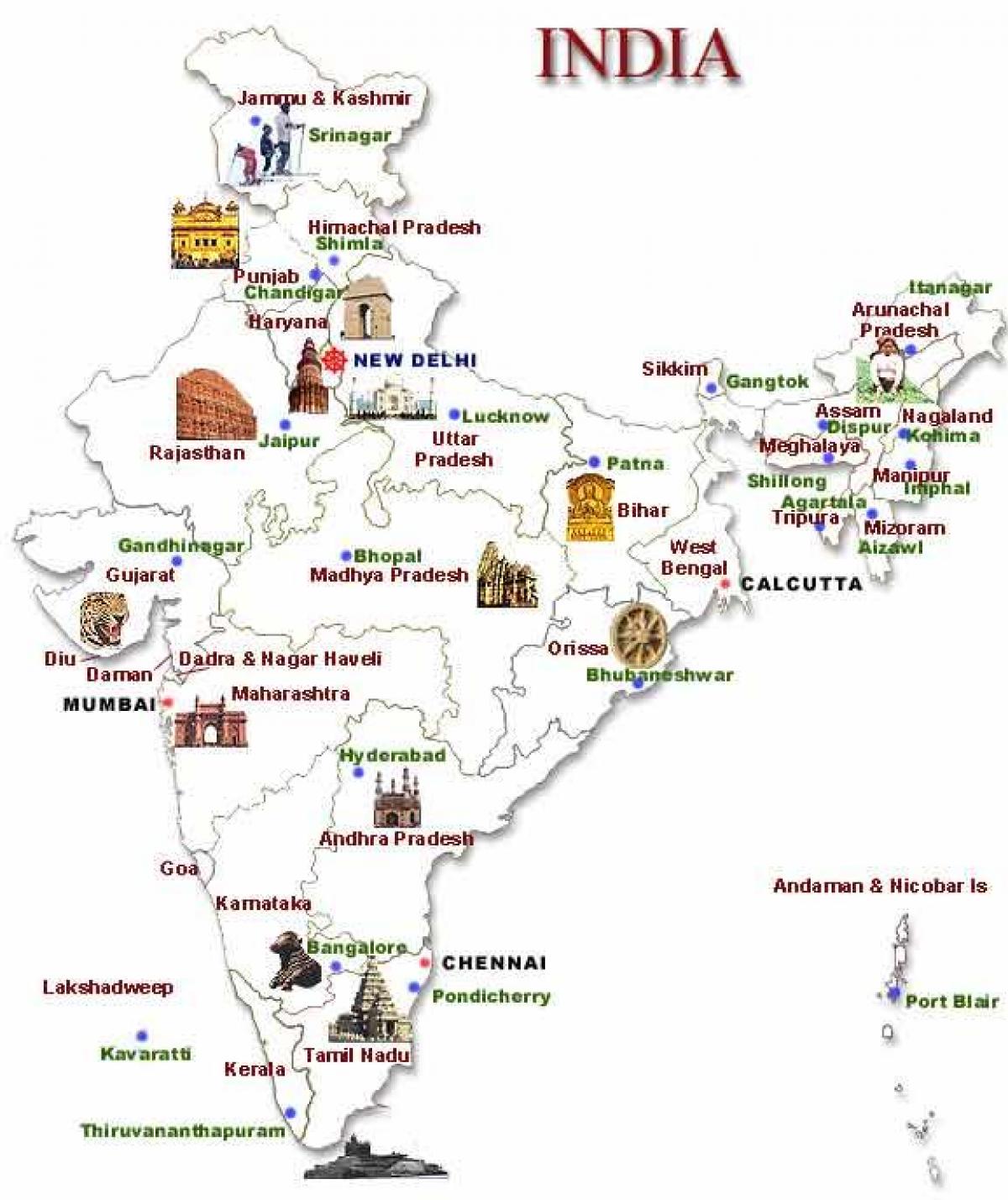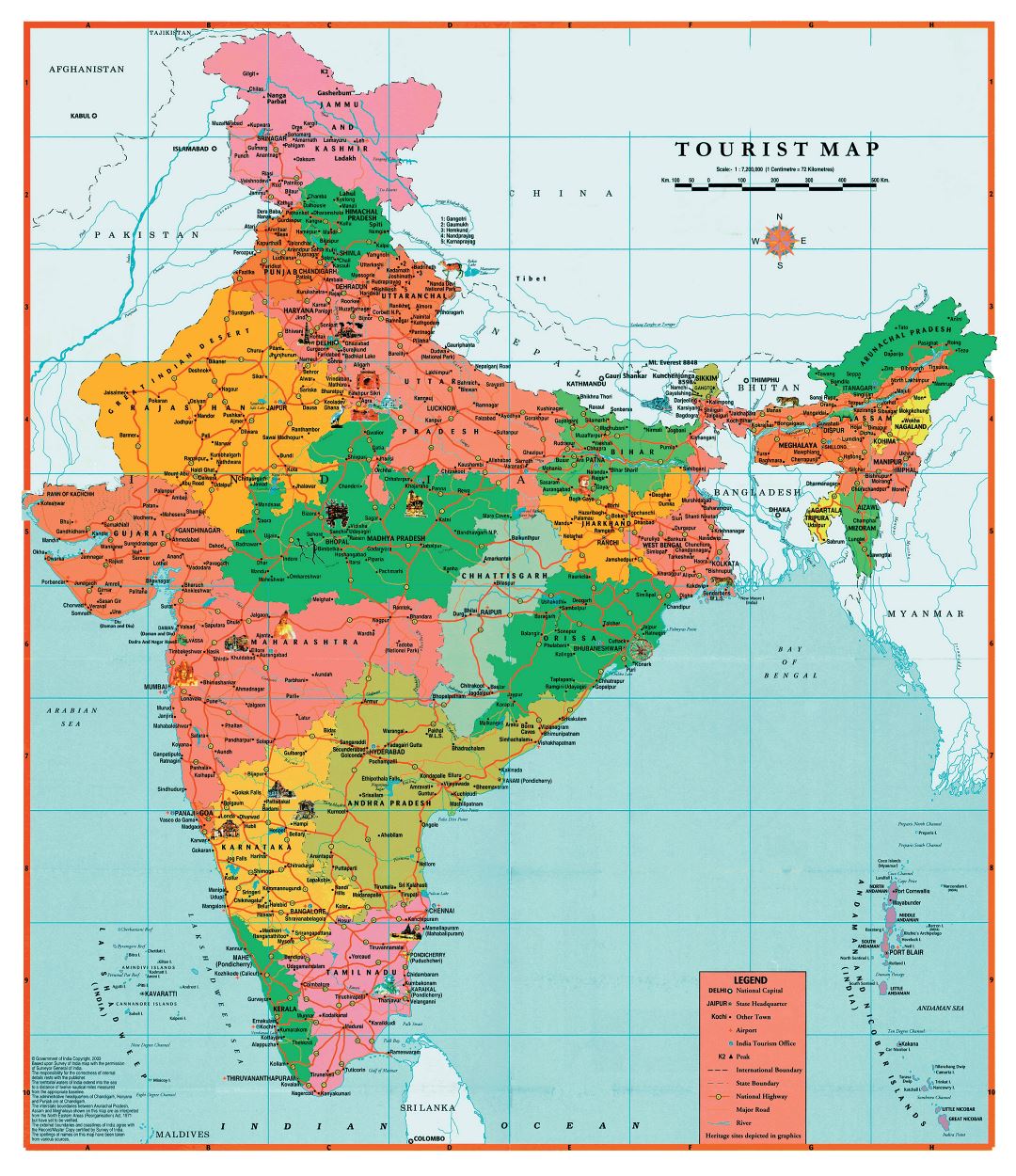Traveling through India is like flipping through the pages of a vibrant history book, with each region offering a unique story and experience. As a travel enthusiast, I’ve had the privilege to explore many corners of this incredible country, and creating a tourist map of India has been one of my most rewarding experiences. This article will serve as your comprehensive guide to navigating India’s diverse landscapes, cultural treasures, and iconic landmarks, using the power of a well-structured tourist map.
Why a Tourist Map of India is Essential
India’s vastness can be overwhelming. A tourist map simplifies your journey, helping you plan your itinerary efficiently. Whether you are a backpacker seeking adventure, a family wanting a comfortable trip, or a solo traveler in search of soul-searching experiences, a detailed tourist map can be your best friend.
Understanding India’s Geography
Covering 3.287 million square kilometers, India features an array of landscapes from the snow-capped Himalayas in the north to the serene beaches of Goa in the west. Each region has its own culture, food, and attractions. Here’s an overview of the primary geographical regions:
- North India: Known for its historical landmarks like the Taj Mahal, bustling cities like Delhi, and the spiritual hubs of Varanasi and Rishikesh.
- South India: Famous for its temples, backwaters, and cuisine, including destinations such as Kerala, Tamil Nadu, and Karnataka.
- East India: Offers the beautiful landscapes of Darjeeling and the cultural richness of Kolkata.
- West India: Home to the desert landscapes of Rajasthan and the glamorous beaches of Maharashtra and Goa.
- North-East India: A hidden gem with lush greenery and unique tribes in states like Sikkim and Assam.
Creating Your India Tourist Map
Step-by-Step Guide to Mapping Your Journey
To create your tourist map, follow these steps:
- Identify Key Destinations: Research must-visit places in India based on your interests—cultural, historical, or leisure.
- Plan Your Route: Use the tourist map to strategize the most efficient travel routes between major cities.
- Schedule Your Time: Allocate time for each destination, factoring in travel time, activities, and rest periods.
- Local Insights: Consider using local transport maps to navigate public transport in metropolitan areas.
Top Tourist Destinations in India
Northern Wonders
In North India, you’ll encounter a blend of ancient history and modernization. Here are some highlights:

Taj Mahal, Agra
No trip to India is complete without visiting the iconic Taj Mahal. This UNESCO World Heritage Site is a stunning testament to love and architecture. I remember standing in awe of its grandeur at sunrise, as the marble glimmered with the first rays of the sun.
Jaipur, The Pink City
Known for its forts and palaces, Jaipur offers a glimpse into the royal past of India. Don’t miss the Amber Fort and the City Palace.

Southern Delights
The south of India showcases an entirely different cultural landscape. Here are two must-visit places:
Kerala Backwaters
Exploring the backwaters on a traditional houseboat is a serene experience. The lush greenery and tranquil waters create a perfect escape from city life.

Mysore Palace, Mysuru
This magnificent palace is a perfect blend of Indo-Saracenic architecture and fascinating history. Don’t miss the nighttime illumination of the palace, which is simply breathtaking.
The East Coast Experience

Darjeeling
The tea gardens in Darjeeling are picturesque. I enjoyed sipping on the finest Darjeeling tea while watching the sun rise over the Himalayas.
Kolkata
The City of Joy is rich in culture, literature, and arts. The Victoria Memorial and Howrah Bridge are landmarks worth visiting.

Western Escapades
Goa
Famous for its beaches and nightlife, Goa is a paradise for beach lovers. I fondly recall beach hopping and enjoying local seafood delicacies.
Jaipur and Udaipur, Rajasthan
Rajasthan is truly royal. Udaipur’s Lake Palace is a sight to behold. I recommend taking a boat ride on Lake Pichola for stunning views.
Understanding Transportation in India
India’s transportation system is vast and complex. Here’s a look at the primary options:
Air Travel
Domestic flights are an efficient way to cover large distances. Major cities like Delhi, Mumbai, and Bangalore are well connected.
Trains
Traveling by train offers a unique experience. The Indian Railways is one of the largest railway networks in the world. Be sure to book your tickets in advance, especially for popular routes.
Public Transport
Metros in major cities like Delhi and Mumbai are convenient. Auto-rickshaws offer a fun and quick way to navigate congested streets.
Travel Tips for Navigating Your India Tourist Map
Packing Essentials
- Lightweight Clothing: Depending on the season, pack breathable fabrics.
- Comfortable Shoes: Essential for exploring the numerous historical sites.
- Power Adapter: Don’t forget to bring a universal power adapter!
Safety Tips
India is a safe country for tourists, but it’s wise to follow these safety tips:
- Keep your belongings secure, especially in crowded areas.
- Be cautious when using public transport at night.
- Consult locals for safe areas to visit, especially in less populated regions.
Comparing Tourist Maps: Digital vs. Paper
| Feature | Digital Maps | Paper Maps |
|---|---|---|
| Accessibility | Available on smartphones, can be updated | Physical copies, limited to what you have |
| Details | Dynamic information and GPS guided | Static, may lack timely updates |
| User-friendliness | Interactive and easy to navigate | Requires map-reading skills |
| Cost | Free or low-cost apps | Generally, more expensive for high-quality maps |
Pros and Cons of Traveling in India
Pros
- Diverse cultures and languages
- Rich history and heritage
- Culinary delights that vary by region
- Vast landscapes and natural beauty
Cons
- Traffic congestion in major cities
- Possible language barriers in rural areas
- Health and hygiene issues in some regions
- Overwhelming crowds in tourist hotspots
Personal Travel Experiences
Every traveler’s journey through India is unique. Here are a couple of memorable experiences I’ve had:
Cultural Festivals
Experiencing Diwali in India was magical. The entire country lights up with diyas (lamps) and fireworks. I felt the warmth of the locals, inviting me into their homes to celebrate with them.
Local Cuisine Adventure
Trying street food in Delhi was both thrilling and delicious. From chaat to parathas, every bite was an explosion of flavors. Just remember: always choose a busy stall to ensure freshness!
FAQs about Traveling with an India Tourist Map
What is the best way to travel around India?
The best way to travel depends on your comfort level and budget. Trains are popular for long distances, while buses and local transport are ideal for city exploration.
Can I rely solely on digital maps in India?
While digital maps are convenient and often updated, having a paper map as a backup is wise, especially in areas with poor internet connectivity.
What should I keep in mind while using public transport in India?
Always negotiate fares beforehand for rickshaws and taxis. It’s also advisable to use official apps like Uber or Ola for greater transparency.
Is it safe to travel alone in India?
Traveling alone in India can be safe, but it’s essential to stay aware of your surroundings, especially in less populated areas. Trust your instincts and avoid poorly lit places at night.
Your India Adventure Awaits!
With this ultimate tourist map guide, you are equipped to embark on a mesmerizing journey through India. Each destination holds a story, each dish tantalizes the palate, and every moment creates cherished memories. So pack your bags, grab your map, and let the adventures unfold!